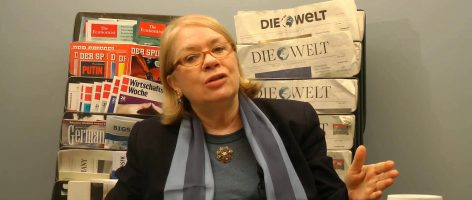Obama and Merkel Craft Their Approaches to Islam, Refugees
In both the United States and Germany, tensions have risen regarding the influx of refugees and relations with domestic and asylum-seeking Muslims. Early this month, President Barack Obama visited the …
Golden Opportunity – The Refugee Crisis’s Economic Potential for Germany
Last fall at the 2015 Frankfurt Auto Show, Dr. Dieter Zetsche, Chairman of the Board at Daimler AG, Head of Mercedes-Benz, and recipient of the 2015 Global Leadership Award abruptly …
The Sad Truth Highlighted by Germany Assaults
AGI Non-Resident Fellow Joyce Marie Mushaben weighs in on the Cologne assaults in this blog post from CNN.
Center-Right Parties and Immigration: Contours of a Conundrum
Immigration policymaking has attracted a great deal of interest recently. Somewhat surprisingly, there is only limited political science scholarship on the role that political parties play in the process. This …
A Comparative Historical Analysis of Policy Trajectories in U.S. Bilingual Education and Islamic Religious Instruction in Germany (1965-2010): The Varying Influences of Anti-Immigrant Populism
Introduction In “Why Islam is Like Spanish: Cultural Incorporation in Europe and the United States,” Aristide Zolberg and Long Litt Woon argue that Islam and Spanish pose cultural threats to …
Recent Authors
AGI provides knowledge, insights, and networks as tools to solve the challenges ahead.
Support Our WorkThe Lost Children of Europe: The Displaced Persons Children’s Centers in the U.S. Occupation Zone of Germany and the Challenges for Relief Workers
As Germany commemorates the 70th anniversary of the end of World War II and the Holocaust, we have an opportunity to reflect on life in the immediate postwar period for …
Impact of the Paris Attacks on Immigration Policy
After the worst attacks on French soil since World War II, anxiety is growing across Europe—including in Germany—on the topic of immigration. The Paris attacks have raised fears that IS …
AGI Transatlantic Exchange Program: Giving Voice to Future Leaders
From October 11-15, 2015, AGI convened the inaugural group of young leaders in its new AGI Transatlantic Exchange Program: Giving Voice to Future Leaders. The participants engaged in exchanges and …
Merkel and Hollande Address European Parliament
In recent years, as Europe has confronted crisis after crisis, we have seen the importance of German leadership, and of integrating that leadership into a community of nations working toward …
Joschka Fischer on German Leadership, the Refugee Crisis, and Chancellor Merkel
From the Jacques Delors Institute, former German foreign minister Joschka Fischer speaks on the topics that are dominating the discussion in Europe: German leadership, the ongoing migrant crisis, and the …




